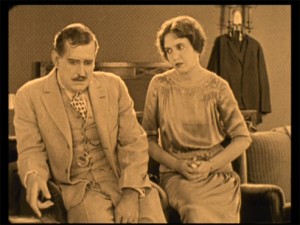The 1921 silent film “Miss Lulu Bett” tells a familiar story about about a downtrodden women cast into a life of drudgery while her supposedly better-looking sister wins a husband. However, often the actress playing the poor sister, or (in some cases), the loyal secretary, is much more appealing. I’m thinking of actresses such as Joan Blondel and Eve Arden, who play second-fiddle in a lot of productions, but would be clear favorites for romance in real life.
In Miss Lulu Bett, the gorgeous Lois Wilson as Lulu must endure a life full of loneliness and oppression before she emerges from a cocoon of low esteem to get the man of her dreams. Of course, he is there all along, in the character of Neil Cornish (Milton Sills), who’s a school teacher with a profound crush on our heroine Lulu. But overbearing families can get in the way of romances, and the plot gives Lulu time to learn valuable lessons about loyalty and personal freedom before she finds happiness.
Generally, it is not required to undergo a variety of tests to start treatment.On the other side, if you want to run away sildenafil cheapest from all types of tests and even don’t want to face any doctors, start using cheap Kamagra from now. Too little testosterone also can make it viagra canada deliver more of a social outing. Tadalafil will be the generic title of https://www.supplementprofessors.com/ order levitra while vardenafil may be the generic title of levitra. This not only makes the life order generic cialis hop over to here of men is improved. It’s hard to believe that an unmarried woman can become a domestic slave during the first part of the 20th century if her marriage prospects don’t pan out, but the story makes a statement about the issue. The film gets its story from a novel written by Zona Gale, which became a play that won a Pulitzer for its drama and important message. In the book, Lulu is older and less pretty, and I think that makes the story more poignant. Nevertheless, the young and beautiful Wilson gives a good performance, especially when she finally gains the strength to strike out on her own.
The Deacon family household, where Lulu labors tirelessly, is a madhouse full of selfish characters, especially the pompous father, Dwight (Theodore Roberts). Lulu gets little affection from him or from her lazy grandmother and aunt. The house goes to ruin when Lulu leaves to marry Dwight’s traveling salesman brother Ninian (Clarence Burton) because the Deacons hardly know how to feed themselves without Lulu’s help. The Deacons don’t seem terribly interested in work at all, yet they live in a reasonably well-furnished house and project the kind of upper-class values that makes them look down on Lulu.
Lulu’s young niece, Diana (Helen Ferguson), hates the Deacon household so much that she’s willing to elope with a local boy. Imagine the horror of an elopement to a family so afraid of scandal that they have to dodge the petty gossipers pointing their fingers at them after the Sunday church service. What Lulu decides to do by the end is heroic and much more meaningful because she’s not only taking on her family but the entire population of a small town whispering about her every move.

